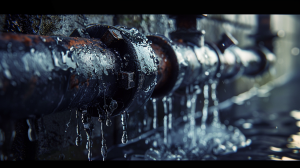Plumbing emergencies can strike unexpectedly and cause significant inconvenience or damage if not addressed promptly. As a homeowner, having the knowledge to tackle these situations can save you time, money, and stress. In this blog post, we’ll explore some of the most common plumbing emergencies and provide step-by-step guidance on how to handle them effectively.
Common Plumbing Emergencies
1. Burst Pipes:
- Identify the Location: Turn off the main water supply immediately to prevent flooding.
- Drain Faucets: Open faucets to relieve pressure.
- Contain the Leak: Use towels or buckets to contain the water.
- Call a Professional: Contact a plumber to repair or replace the burst pipe.
2. Clogged Drains:
- Use a Plunger: For minor clogs, try using a plunger to dislodge the blockage.
- Avoid Chemicals: Refrain from using chemical drain cleaners, as they can damage pipes.
- Try a Drain Snake: If plunging doesn’t work, use a drain snake to clear the blockage.
- Consult a Plumber: Persistent or severe clogs may require professional intervention.
3. Water Heater Issues:
- Check the Pilot Light (for Gas Heaters): Ensure the pilot light is lit. If not, follow the manufacturer’s instructions to relight it.
- Inspect the Thermostat: Adjust the temperature settings as needed.
- Flush the Tank: Sediment buildup can affect water heater performance. Periodically flush the tank to remove sediment.
4. Leaky Faucets:
- Turn Off Water Supply: Shut off the water supply valves under the sink.
- Replace Washers or Seals: Often, leaks are caused by worn-out washers or seals. Replace these components as necessary.
- Consider Professional Repair: If DIY methods don’t resolve the issue, seek professional assistance.
When to Call a Professional
While DIY solutions can address many plumbing issues, certain situations warrant professional attention:
- Extensive Damage: Significant water damage or structural issues require immediate professional intervention.
- No Hot Water: Persistent water heater problems may indicate underlying issues that a plumber can diagnose.
- Complex Repairs: Projects involving extensive pipe replacement or sewer line issues are best handled by professionals.
Preventive Measures
To minimize the risk of plumbing emergencies, consider these preventive measures:
- Regular Maintenance: Schedule routine inspections and maintenance with a licensed plumber.
- Monitor Water Pressure: Excessive water pressure can stress pipes. Use a pressure gauge to ensure optimal levels.
- Address Minor Issues Promptly: Don’t ignore small leaks or unusual noises. Addressing them early can prevent larger problems later.
By familiarizing yourself with these common plumbing emergencies and their solutions, you’ll be better equipped to handle unforeseen situations efficiently. Remember, safety is paramount, and if in doubt, don’t hesitate to seek professional assistance. A proactive approach to plumbing maintenance can go a long way in preserving the integrity of your home’s plumbing system.
Stay tuned for more helpful tips and insights on maintaining your home’s plumbing system effectively!
